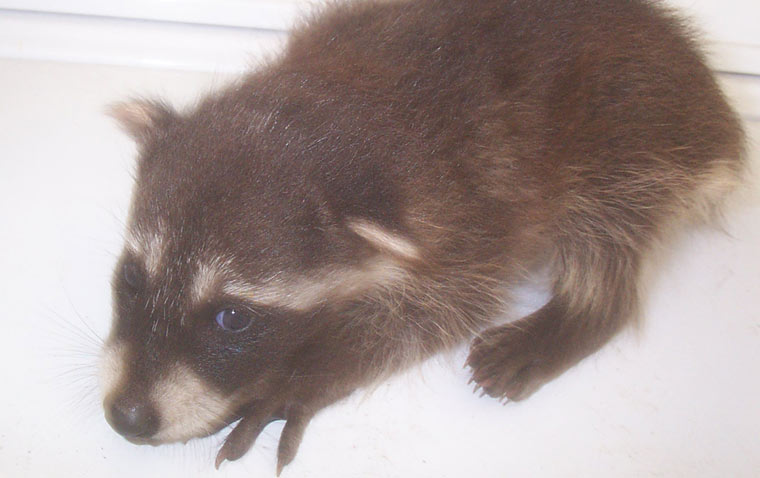- info@wildlife-removal.com
Call us for help in your town
Wildlife Removal Education
I found a baby raccoon. Should I feed it?
Need raccoon removal in your hometown? We service over 500 USA locations! Click here to hire us in your town and check prices - updated for year 2020.
Would you like the long answer or the short answer? Either way, they're pretty much the same thing: NO, you should not feed a baby raccoon that you have found.

Here are a few reasons why:
1 - Does the baby look orphaned? It might not be. Mother raccoons move their young (kits) from one den to another, usually after just a few nights. They do this to keep safe and to ensure they can easily access food. It is dangerous to move her young, but she will do that if she needs to, and the "lost" little raccoon baby that you have found might just be one in the midst of its travels. If she has a couple of kits to transport, it will take her a while and she may need to stagger their movements. If you leave it a few minutes, you might just find that the raccoon comes back and claims her baby. She will not do this if the baby smells of you — do not touch or feed a baby raccoon. She may also attack you if she spots you getting too close to her young. Mothers of most animal species are usually fiercely defensive over the young all the time they are still under her care. Read about What should you do if you find a baby raccoon on its own?
2 - If the baby raccoon HAS been orphaned, there is usually a very good reason for it. If the mother senses that her young is too weak to survive, she'll leave it behind. If the youngster is sick, the mother will abandon it. This is not a cruel act, but more of a humane one in some ways. She knows that she won't be able to care for a healthy youngster and a sick one. She needs to ensure she's putting all of her efforts into raising a youngster that has the best possible chance of survival. The runt of the litter doesn't have the best possible chance of survival — it's survival of the fittest after all — so she will leave it behind. If she doesn't do this, she runs the risk of losing BOTH of her kits. If she has multiple young — three or more — the need to pick "favorites" is even greater. She won't have enough food to feed all of them until they are old enough to leave the nest and fend for themselves.
3 - The baby raccoon might have rabies. We know that it looks harmless enough, but can you really be so sure? If the baby bites you and the teeth are sharp enough to penetrate the skin, the virus present in the saliva of that animal will then make its way into your bloodstream. You then have the rabies virus.
It doesn't need to be a scratch; if the animal has licked its claws and then scratches you, piercing the skin, the saliva from the lick will then make its way into your bloodstream.
If you have a cut on your hand and some of the saliva (or other body fluids) gets into that cut, the virus will attempt to make its way through your bloodstream.
Even a dead baby raccoon can be infected with rabies and still infectious, so handling ANY raccoon, live or dead, adult or kit, should only be done with complete protection.
4 - What do baby raccoons eat? What can you use as a substitute for raccoon milk? At what age do baby raccoons start to eat solid foods? What do adult raccoons eat? What do they drink? How much should you feed them? And how frequently?
There are so many questions that you will need to know the answer to, besides the question of rabies, obviously. Without doing your research, you might feed the baby something it shouldn't eat or drink, making it ill and potentially killing it off. If the animal is going to die anyway — if the animal is sick — surely it is inhumane to try and keep that animal alive fr as long as possible?
And, of course, we have the biggest question of all: can you be sure that you are safe when feeding the baby raccoon? In almost every single case, the answer to that last question will be no, and that's why you shouldn't do it.
Go back to the Raccoon Removal page, or learn tips to do it yourself with my How to Get Rid of Raccoons guide.


















